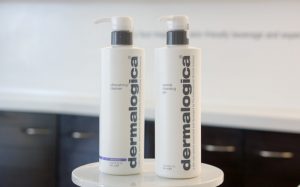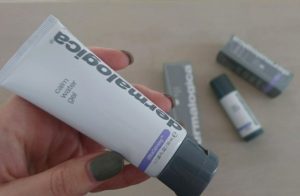Do you have sensitive skin? Get in line, because as it turns out so do a lot of people these days. Along with dry skin, sensitive skin is one of the most common self-reported skin concerns amongst men and women. According to Dermstore.com, as much as 50 percent of the population report to have sensitive skin but skin experts aren’t so sure about the accuracy of those numbers. Many people think they have sensitive skin even if they don’t. What some people experience is a slightly similar skin condition called ‘sensitised’ skin, a skin reaction triggered by your lifestyle, skin care products or pollution. So, what is the difference between sensitive and sensitised skin and how can you treat it?
Sensitive versus sensitised skin:
Sensitive skin is a skin type prone to redness, irritation, and dryness. When you apply a product, you might notice tingling, stinging, and occasional red, flaky patches. This reaction is due to the outermost layer of the skin (the stratum corneum) being thinner and therefore weaker. Sensitive skin is also a skin type that you are predisposed to or born with. Naturally, the skin is not as capable of keeping in moisture and acting as a barrier to keep pollutants and allergens out, leading to irritation.

Sensitised skin, on the other hand is often triggered by both external and internal factors. Things like pollution, alcohol, smoking, chronic emotional and physical stress, poor diet, and extreme temperatures are the leading culprits of inflammation and red, irritated skin. Certain skin care and makeup ingredients, such as fragrances, artificial colours, lanolin, mineral oils, and alcohol, may also sensitise your skin.
Treating sensitised skin:
The great news for those with sensitised skin is that the symptoms can be managed by making a few lifestyle changes or using skin care products designed to calm, hydrate and strengthen your skin. Whether you have sensitive or sensitised skin, the symptoms are similar and can be treated by using products that address skin inflammation, dehydration and a compromised barrier.

First and foremost, use a gentle pH-balanced gel or cream cleanser morning and night. Look for something that can be used over the face and eyes and that doesn’t strip the skin’s moisture or compromise the skin’s protective barrier.
Dermalogica UltraCalming Cleanser is a great choice, especially during the winter months when many people complain of sensitive and sensitised skin.
When dealing with sensitive or sensitised skin, it is important to keep your skincare routine as simple as possible. Follow your cleanser with a super-concentrated skin barrier repairing serum or face oil that will help to strengthen the skin’s barrier, lock in critical moisture and minimise redness and discomfort. Lastly, use a moisturiser designed for sensitive skin. A moisturiser with soothing and hydrating ingredients will help to calm a dry, sensitive skin, while also limiting further irritation on the skin.

Dermalogica Barrier Defence Booster and Dermalogica Calm Water Gel work beautifully together to help calm and soothe inflamed, irritated skin.
Looking for affordable skincare? Shop top skincare brands at the best prices online via PriceCheck now.





